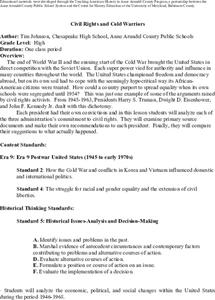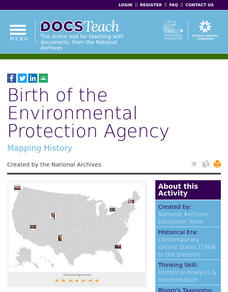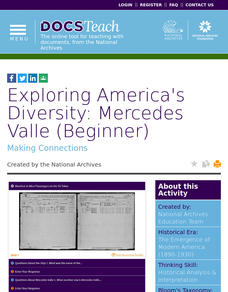Henry Ford Museum
Human Impact on Ecosystems
An environmenta science unit includes three lessons plus a cumulative project covering the ecosystem. Scholars follow the history of the Ford Rouge Factory from its construction on wetlands and how it destroyed the environment to its...
Smithsonian Institution
Borders within the United States: Indian Boarding Schools and Assimilation
Native American Nations ... sovereign entities or removable tribes? A thought-provoking lesson explores the relationship between Native American tribes and the United States, including forced assimilation and removal from their ancestral...
Center for History Education
Civil Rights and Cold Warriors
Three presidents, three views on civil rights. Scholars compare the administrations of President Truman, Eisenhower, and Kennedy to understand how each addressed the issue of civil rights. The instructional activity uses primary sources...
DocsTeach
Birth of the Environmental Protection Agency
Seeing is believing when it comes to climate change. An informative activity explores the creation of the Environmental Protection Agency (EPA) and its efforts to document environmental issues with photographs. Academics match images...
Smithsonian Institution
Separate is Not Equal: Fight for Desegregation
Separate is not equal! An eye-opening lesson delves into the past to understand the fight for desegregation and how it impacted African American communities. Academics complete two one-hour lessons using documents, photographs, and...
University of California
Was Slavery Always Racial?
The lesson focuses on slavery in the ancient world and asks academics to decide if it was always about race. Scholars view primary sources, participate in a short discussion, and complete a worksheet to understand how slavery in the...
DocsTeach
Letter to Truman about the Manhattan Project
Delve into the past to understand the opposition to the Manhattan Project. An interesting activity is designed to be completed in pairs, groups, or individually. Scholars analyze historical documents, complete an online worksheet, and...
Smithsonian Institution
Strength in Solidarity: Coalition of Immokalee Workers and the Campaign for Fair Food
Not all food is created equal. The lesson dives into the world of migrant farm workers to show their struggles to earn livable wages and better working conditions. Academics learn why the Coalition of Immokalee Workers was created and...
Center for History Education
Speaking Freely In the Soviet Union's Autocratic Government
Speak your mind! The lesson explores the difference in free speech between the United States and the Soviet Union. Academics review the constitutions of both governments, political cartoons, and case studies to understand how freedom of...
Center for History Education
A Presidential Decision - The Bay of Pigs
The lesson examines President Kennedy's response to the Bay of Pigs Crisis and Cold War tensions. Academics learn how the information President Kennedy had affected his response to the question of whether to invade Cuba. Scholars read...
Curated OER
The Great Gatsby Historical Background Using Multi-Genre Research Project
Before beginning F. Scott Fitzgerald's The Great Gatsby, create a historical context of the Roaring 20s with this instructional activity. Set up a gallery walk with the provided PowerPoint, which features 10 topics related to the 1920s....
DocsTeach
Apollo-Soyuz: Space Age Detente
The Space Race saw the Soviet Union and the US go from competitors to partners. Scholars read a letter regarding the first docking of the US and Soviet space craft. Young historians also complete a written assignment and participate in...
DocsTeach
Exploring America's Diversity: Mercedes Valle (Beginner)
An enlightening activity focuses on the life of Mercedes Valle, an immigrant from Ecuador. Scholars analyze ships and census records to understand the life of Mercedes Valle. In addition, they participate in a group discussion and...
DocsTeach
Baseball: A Morale Booster During Wartime?
How did baseball become America's national pastime? A sports-minded activity explores the importance government placed on baseball to boost morale during both world wars. Academics read letters to understand the importance of baseball...
University of California
Interactions in Baghdad and the Abbasid Caliphate
An interesting resource focuses on the cultures of different peoples that have lived in Baghdad and their interactions. Academics view 11 sources to understand how Baghdad has been home to people of many faiths and cultures throughout...
University of California
Influences from South to Southeast Asia
In ancient times, people along trade routes exchanged ideas in addition to goods. Scholars view eight primary sources, such as artwork, to understand how India influenced southern Asia. Academics participate in a short group discussion...
University of California
The Virgin of Guadalupe
A worldly resource focuses on the transfer of goods, ideas, and religion that took place as part of the Columbian exchange. Academics view sources such as text and artwork to help them complete a worksheet.
Center for History Education
Japanese American Internment During World War II
World War II turned nations against each other and neighbors into enemies. An eye-opening activity explores the dark past of Japanese-American internment camps during WWII. Scholars learn of the fear and distrust toward Asian Americans...
Smithsonian Institution
Re-Segregation of American Schools: Re-Segregation
Examine the re-segregation of public schools in a thought-provoking resource. Young scholars read articles and primary sources, complete worksheets, and watch a video to explore the idea that desegregation made schools more segregated....
National Endowment for the Humanities
The Argument of the Declaration of Independence
When in the course of a course on historic American events, it becomes necessary for learners to examine, with decent respect, the Declaration of Independence, it becomes evident that there are six separate and equal parts of that...
Scholastic
The Flight of Amelia Earhart Teaching Guide
Amelia Earhart's accomplishments and strength of character extend beyond her status as one of the first female aviators in America. Elementary and middle schoolers learn about Earhart's early life and the historical context surrounding...
Center for Civic Education
Historical Analysis of Constitutional Amendments
Each of the 27 Amendments to the U.S. Constitution were adopted within specific economic, political, social or cultural, and international contexts. As part of their Constitution Day/Week studies, seniors investigate these factors for...
DocsTeach
Political Cartoon Analysis: No Taxation Without Representation
Delve into the world of political cartoons in a lesson on the American Revolution. Scholars practice analyzing an original political cartoon, answer questions, and participate in group discussion. Young academics gain an understanding of...
University of California
Impact of the California Missions on Native Americans
While the Spanish claimed to bring civilization to California indigenous peoples, in reality, they also brought violence and forced assimilation to European values. Primary sources, such as the reports of Catholic priests and Europeans...

























